
Welcome to Twin Speech, Language & Literacy LLC! (Previously known as Twin Sisters Speech and Language Therapy LLC). Our mission is to make original theme based materials that are both useful and fun! We strive to make every single therapy session interactive, enjoyable, and very beneficial! We love being speech therapists and enjoy knowing that our students want to come back each and every week!
Monday, May 27, 2013
Tuesday, May 21, 2013
Thematic Speech & Language Therapy Sessions
Hi! We were excited to be guest posters over at Crazy Speech World today! In case you missed the posting that we did over there on Thematic Speech & Language Units, we have decided to replicate it here at our blog. Happy reading and thanks for stopping by!
Today, we would like to post on the benefits of using thematic units in speech and language therapy sessions. We hope that you may be inspired to begin to use themes by reading this post because we think that having a weekly theme can be a fun, useful, and productive way to approach speech therapy sessions with children of all ages.
Next week we are featuring a Memorial Day theme at our clinic. It will contain a lot of colorful flags and patriotic games and activities. Maybe this post will inspire you to do an inspirational Memorial Day themed speech therapy themed week as well? At the end of our guest post we have provided a link to our freebie document that could be used in any patriotic themed week, such as Memorial Day, President’s Day or July 4th. We hope it will turn into a fun and useful document for many of you to use on each or every one of these colorful and meaningful American themed holidays!
Our Freebie is called "PATRIOTIC PRONOUNS AND PREPOSITONS".

What is a thematic speech and language therapy unit?
It is the integrated use of an interesting book, holiday, season, or topic of interest in a planned speech and language therapy session. It allows for the cohesion of a variety of targeted speech, language, and literacy goals during one or several different speech therapy sessions. It is similar to the integrated teaching curriculum approach that early childhood educators have used for years to teach their children a variety of skills. In fact, “teachers have used children's books, topics that interest children and projects to motivate them and to teach them the necessary skills and concepts to be successful in school and life since the early onset of classroom teaching” (Benson 2013).
It is the integrated use of an interesting book, holiday, season, or topic of interest in a planned speech and language therapy session. It allows for the cohesion of a variety of targeted speech, language, and literacy goals during one or several different speech therapy sessions. It is similar to the integrated teaching curriculum approach that early childhood educators have used for years to teach their children a variety of skills. In fact, “teachers have used children's books, topics that interest children and projects to motivate them and to teach them the necessary skills and concepts to be successful in school and life since the early onset of classroom teaching” (Benson 2013).
What are the benefits of using a thematic approach to therapy?
The benefits of using a thematic approach to speech therapy session are substantial. That is because thematic teaching, “provides an environment that fosters and encourages process learning and active involvement” (Fisher, 1991). Here is a list of some benefits of thematic learning that we have read in literature and have seen happen at our clinic:
1) Themes provide a functional foundation for learning and that equals good carryover beyond the therapy room.
2) Themes help children relate to real-life experiences and build on what they know because a lot of independent experiences are brought up by the students and then reinforced by the activities and therapist.
3) Thematic units help to make connections to transfer knowledge they learn and apply it in a meaningful way. This is seen with the completion of a project or recipe that represents the theme being focused on.
4) Themes help to teach facts to children in a fun way. Facts presented randomly would probably be harder to grasp and uninteresting to the student.
5) Themes help the student to become physically involved with learning. This is something that is especially important for the children we see who have ADD, Autism, or SI disorders and who actually have to move in order to stimulate their brains for learning. Some children are truly kinesthetic learners and sitting for long periods of time is not the best way for them to learn.
6) Themes help the therapist to target a lot of individual student needs and goals. Every child has a wide variety of goals that we are usually targeting at one time and that is why when we are planning on doing a themed unit we will make a variety of activities available for the taking! For example, a sequencing activity, a listening for detail activity, a social pragmatic goal, an articulation activity, a literacy and number activity, a concept and preposition activity, a grammar activity, and more…
7) Themes are motivating and relevant to the child. We know this to be true because the students at the clinic ask what the theme will be each week and look forward to coming. We’ve been told by more than one child that they would rather come to speech therapy than do anything else. They have fun experiencing the themes and they learn at the same time!
8) Mostly, themes are fun and make therapy interesting and new each session for the children! That is why we enjoy providing themed speech and language units!!
What are some examples of thematic speech therapy sessions?
Examples of thematic units that we have used at our clinic include: dinosaurs, space, wild animals/zoo, pets, ocean, camping, Cinco De Mayo, fire station, transportation, super hero, snowmen, St. Patrick’s Day, Thanksgiving, President’s Day, Valentine’s Day, and so many more! The list of possible themes is quite large. We found this wonderful freebie to a calendar listing a variety of different thematic speech therapy unit ideas. Take a look. It supplies a substantial amount of theme ideas and we love it! Speech Therapy Theme Calendar
Where do you get your ideas and supplies for your themed speech therapy units?
We gather information and supplies from a variety of sources. To start, we often make our own themed speech; language and literacy units with cute clip art obtained at places like Scrappin Doodles, Clips by Jenn, or Graphics From the Pond, and will use that material during or themed speech therapy sessions. Please click on our themed speech and language units tab at our blog, Twin Sisters Speech & Language Therapy, to see what we have made.
We also look for a different materials made by fellow speech language pathologists on TpT, Pinterest, Speech Therapy Ideas website, or Facebook. We go to on-line teaching sources like Ed Helper, Free Printables, Enchanted Learning, and Education.com. And because we are providing a FREE themed document for Memorial Day at the end of this post, we have included links to that subject matter for you at the last four mentioned on-line source sites.
Another wonderful place for free themed pintables can be found at 1plus1plus1.
Our favorite place to buy crafts at a reasonable price is Oriental Trading Company.
Our favorite maker of puzzles, educational toys, and sticker scenes is Mellissa and Doug.
We also hit up our local Dollar Store, Wal-Mart, Target, or grocery store to buy needed items to finish off our units.
Here are some example pages in this packet focusing on:
PRONOUNS: HE, SHE, IT, THEY, HIM, HER, HIS, HERS, THEIRS, THEM
PREPOSITIONS: IN, ON, UNDER, BESIDE, BETWEEN, ACROSS, NEAR, BELOW, ABOVE, NEXT TO, BEHIND, IN FRONT OF, NEAR, AROUND, BENEATH, AND OVER
Use this LINK to download your copy of
Patriotic Pronouns and Prepositions!
Find us at:
Thank you so much for your support!
Shanda Gaunt M.S. CCC/SLP and Manda Riebel M.A. CCC/SLP
References
· Fisher, B. (1991). Joyful Learning: A Whole Language Kindergarten. Portsmouth, N.H.: Heinemann.
· Integrated Teaching Units article written by Tammy R. Benson, Ed D, Information taken on 5/9/2013 from http://www.pbs.org/teachers/earlychildhood/articles/integratedunits.html
Heartfelt Wish
Our hearts ache for the people of Oklahoma City. The tornado resulted in a tremendous amount of loss of personal items, and most sadly of all, family members of all ages. It is a tremendous tragedy and our hearts are full of sympathy and love for all of the victims and their family and friends.
We read that the American Red Cross started helping the families right away and that every dollar sent their way is used appropriately. One way we could all help is to send them a donation today. Here is a link to the American Red Cross if you would like to make a donation.
Sending our deepest condolences during this difficult time.
Manda & Shanda
We read that the American Red Cross started helping the families right away and that every dollar sent their way is used appropriately. One way we could all help is to send them a donation today. Here is a link to the American Red Cross if you would like to make a donation.
Sending our deepest condolences during this difficult time.
Manda & Shanda
Tuesday, May 7, 2013
Our Favorite Games To Play In Speech!
Jenna Rayburn from Speech Room News asked all of us bloggers what our favorite games were to use in speech. She's starting a new feature called Love It & List It linky party. We wanted to join in on the fun so we decided to reshare our top ten favorite games to play in speech list. It's below!
It was very hard to choose just 10! We knocked it down from an original list of 30! Other games that get an honorable mention from us are:
Cariboo, Chutes and Ladders, Operation, deck of cards, Uno, Guess Who, Don't Break the Ice, Twister, Scrambled Eggs, Don't Say It, AB Seas, Scrabble Alphabet Soup, Don't Spill The Beans, Sequence for Kids, Guess Who, HedBanz, Hi Ho Cherry-O, Let's Go Fishin, Trouble, Jenga, Sorry, Monkeying Around, Checkers, Connect Four, Would You Rather?, and good ole Candy Land!
Our top 10 favorite games all promote movement, turn-taking (so we can target a speech goal while playing them), and bring a fun challenge of some sort to the therapy room. The kids love them and so do we!
And the TOP 10 LIST IS...
DRUM ROLL HERE PLEASE!
1. Kerplunk-
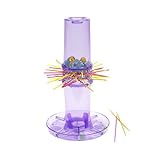 $16.97 at Amazon
$16.97 at Amazon2. Hold on Scooby Doo
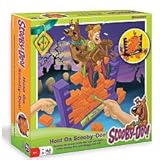 $14.44 at Amazon
$14.44 at Amazon3. Honeybee Tree
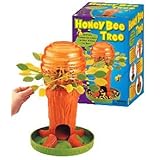 $13.99 at Amazon
$13.99 at Amazon4. Pop Up Pirate
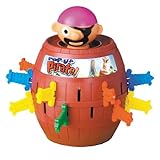 $22.89 at Amazon
$22.89 at Amazon5. Pop The Pig
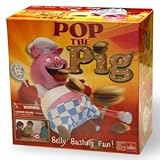 $29.99 at Amazon
$29.99 at Amazon6. Rhino Rampage
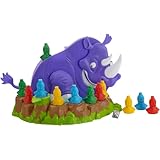 $17.99 at Amazon
$17.99 at Amazon7. Topple
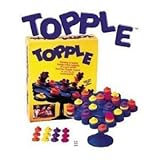 $8.68 at Amazon
$8.68 at Amazon8. Lucky Ducks
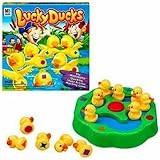
$16.06 at Amazon (Sesame Street Edition)
9. What's In Ned's Head
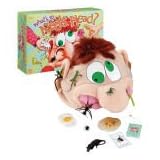 $34.95 at Amazon
$34.95 at Amazon10. Crocodile Dentist
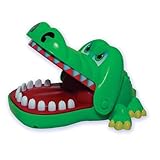 $9.99 at Amazon
$9.99 at AmazonWe hope you find this list helpful! Perhaps there's a game or two that you didn't know about or one or two that you've been meaning to purchase for your therapy room?
ALWAYS IN SPEECH AND LANGUAGE FUN,
Shanda and Manda, SLP's
Monday, May 6, 2013
Teacher Appreciation Sale!
We appreciate all of the teachers and therapists out there and to show you this, we are participating in the TpT Teacher appreciation sale!! Please know that all Twin Sisters Speech & Language Therapy documents will be on sale for 20% off this Tuesday and Wednesday May 7th and May 8th, and that by entering the code (TAD13) at checkout, you will receive another 8% off from TpT. That's 28% off every single document in our store. Yay!!
We hope this will help to fill up your teaching drawers for this year or next!
*Our store at Teachers Notebook is on sale too!
Best wishes and happy shopping!!!
Manda & Shanda, SLP's
Twin Sisters Speech & Language Therapy
Early Pronouns and Prepositions
Pronouns and prepositions are common grammar areas to target with our pre-k kiddos. We developed this packet to keep the younger crowd moving and having fun while they learn to use them correctly. Here is a list of the pronouns and prepositions targeted in this fun playground themed treatment packet.
PRONOUNS:
HE, SHE, THEY, HIM, HER, HIS, HERS, THEIRS
PREPOSITIONS:
IN, ON, UNDER, BESIDE, BETWEEN, ACROSS, NEAR, BELOW, ABOVE
We hope your kids love moving these cute girls and boys around the fun playground! Some sample pages attached! Enjoy!
Take Care and best wishes,
Manda & Shanda
or at our
THANK YOU!
Saturday, May 4, 2013
THE BIG SALE- Teacher Appreciation week!
It's a great time to buy Twin Sisters Speech & Language Therapy documents! Starting today, Teachers Notebook will take an additional 10% off on everything that we put on sale for 25% off at Teachers Notebook. It's a great deal and we hope that all of the teachers and therapists out there can take advantage of this sale to stock up on their treatment material cabinets! It's our way to show appreciation to a bunch of hard working and talented people who need a little help by receiving some easy to use and beneficial speech, language and literacy documents. And that is without breaking the bank in order to do so!
Best wishes and happy shopping!!
P.S. Look for the Teachers pay Teachers Appreciation sale information soon too! The sale over there is starting on May 7th and will go until May 8th. Yay!
Manda & Shanda, SLP's
Friday, May 3, 2013
Material Swap! Speech Language Assessment Checklist for Preschool Children from Smart Speech Therapy LLC.
Hello Everyone! We are happy to review a product by a fellow SLP blogger today! Her name is Tatyana Elleseff, MA, CCC-SLP, and her blog is called Smart Speech Therapy LLC. When you are done reading this review, we are confident that you will want to go straight on over to her blog, store or facebook page to read more about her and all of her informative and well written documents. Here are the links that will quickly get you to her BLOG, SHOP and FACEBOOK page!
We had the opportunity to review one of her most recent documents named:
"Speech Language Assessment Checklist For Preschool Children 3:0-5:11 Years of Age" Available for the low price of ($7.99) and available at the link below.
Speech Language Assessment Checklist For A Preschool Child » Smart Speech Therapy LLC | Smart Speech
It is a 9 page guide that was developed to assist speech language pathologists in the process of how to select appropriate tests for preschool age level speech and language therapy assessments. It was also designed to help with the process of how to prioritize assessment needs for preschool children. Pictures of some of the pages are shown below.
The first part of this document is the Speech Language Assessment Checklist.
The checklist is a three page form that can be given to a preschool teacher or caregiver prior to a planned assessment or before an assessment is even being considered. The teacher or caregiver is asked to check areas of difficulty that have been seen with the child in these areas:
Receptive Language
Memory, Attention & Sequencing
Expressive Language
Speech Pronunciation
Voice
Resonance
Phonological Awareness Skills
Social Skills
Problem Solving Abilities
Executive Function
The checkoff list begins with a short personal information area that asks for the date, child's name, age, referral source and a bit more. Then the checklist goes on to cover all of the normal areas of concerns that are often discussed prior to needing to do a skilled speech, language or voice evaluation with a pre-k student. Each area has between 4 to 9 different skills that can be checked off if the caregiver has seen them occurring or not. For instance, under the receptive language category, one may check off:
- ___difficulty understanding what is told without gestures and repetitions
- ___difficulty following simple 1-2 step verbal directions
- ___difficulty following 2-3 step directions
- ___difficulty understanding basic concepts or describing words
- ___difficulty responding to yes/no questions
- ___difficulty responding to simple "wh" questions
We feel that every area that a speech therapist would be interested in for an assessment is covered with this checklist and that each category has a thorough list of possible deficits. We like how some items contain examples of what is being asked for and that the choices are put in ascending order of difficulty.
On the last page of the checkoff list the caregiver or teacher then has the chance to write down what they see as the child's most significant present difficulties and additional information such as medical concerns and other suspected delays such as behavioral, intellectual, and social delays.
Lastly, this thorough document provides a, "Supplemental Caregiver/Teacher Data Collection Form." This form is two pages long and it provides the ranking categories of: always, often, sometimes and rarely. The categories to rank are receptive language, memory, expressive, speech, voice, resonance, phonological awareness skills, social skills, problem solving, and executive function skills. This checkoff list provides even more questions and areas of concern for the teacher/caregiver to consider before a speech and language assessment is performed. This checkoff list provides a nice review of skills needed in different speech and language areas. After the checkoff list is completed the speech therapist can tally the results and initiate testing in the areas that indicated the most severely impaired areas.
Additional thoughts:
- This document would be a wonderful document for any SLP to have, and especially an SLP student or CFY because it provides a nice summary of the most commonly used tests for assessing the pre-k population in the areas of speech, language, and fluency and they may not be aware of all of them.
- Voice areas are mentioned on the checkoff lists, but voice tests are not listed on the testing battery suggestions.
- It is possible that the checkoff list may be a bit difficult for some parents to complete. Examples of what to look for in each area would be helpful for many parents and even a short activity on how to look for the skill would be helpful for the parent who is not knowledgeable in the areas being screened.
- This document is clearly presented, well written, and thorough!
- We feel that a nice variety of skills in varying degrees of complexity are presented and we appreciate that very much! We do have one concern though. We worry that busy teachers may not feel like they have enough time to fill out the form adequately due to the fact that they have to read about a lot of areas and their subsequent skills. Perhaps a "quick screener" could be produced for them that is one page in length and less time consuming? This possible "quick screener" would not replace the first one that covers a lot of useful areas, but could just be one to be given to that teacher or caregiver who seems particularly busy.
- We like the list of speech, fluency and language tests that are provided and we will be certain to present the list to up-incoming speech therapy students and new hires to the speech department to make sure that they are aware of all of them.
Thank you so much Tatyana! We really appreciate the opportunity to review this terrific document and look forward to seeing more from you in the future!!
Do you have any questions or comments for Tatyana at Smart Speech Therapy LLC? If so, click on this link to leave her a message.
For more information visit Tatyana's BLOG, STORE, or follow her Facebook page!!
Tatyana kindly did a review of our life cycle sequencing document. Please go take a look by clicking on the picture below!
Sincerely,
Manda & Shanda, SLP's
Twin Sisters Speech & Language Therapy
Subscribe to:
Posts (Atom)

























